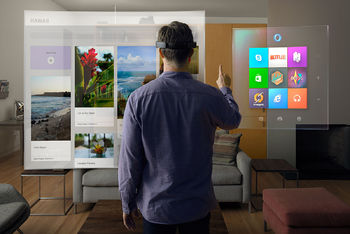Microsoft HoloLens: Difference between revisions
Xinreality (talk | contribs) No edit summary |
Xinreality (talk | contribs) No edit summary |
||
| Line 10: | Line 10: | ||
|Website=[http://www.microsoft.com/microsoft-hololens/en-us Microsoft HoloLens] | |Website=[http://www.microsoft.com/microsoft-hololens/en-us Microsoft HoloLens] | ||
}} | }} | ||
Windows HoloLens is a [[Augmented Reality]] [[device]] developed by [[Microsoft]]. HoloLens was announced in Windows 10 Event on January 21st, 2015. HoloLens is a see through display worn over your eyes. Unlike [[Oculus Rift]] and other [[Virtual Reality Devices|VR devices]], the eye-piece component of HoloLens is transparent. It is able to project virtual content over real world objects. One of the example Microsoft used was Windows-like interfaces were projected onto walls and furniture. Users can interact with these projections with gestures and voice commands. | Windows HoloLens is a [[Augmented Reality]] [[device]] and [[platform]] developed by [[Microsoft]]. HoloLens was announced in Windows 10 Event on January 21st, 2015. HoloLens is a see through display worn over your eyes. Unlike [[Oculus Rift]] and other [[Virtual Reality Devices|VR devices]], the eye-piece component of HoloLens is transparent. It is able to project virtual content over real world objects. One of the example Microsoft used was Windows-like interfaces were projected onto walls and furniture. Users can interact with these projections with gestures and voice commands. | ||
Windows HoloLens runs a self-contained Windows 10 computer. It features HD 3D optical head-mounted display, spatial sound projection and advanced sensors to allow its users to interact its AR applications through head movements, gestures and voices. | Windows HoloLens runs a self-contained Windows 10 computer. It features HD 3D optical head-mounted display, spatial sound projection and advanced sensors to allow its users to interact its AR applications through head movements, gestures and voices. | ||
Revision as of 21:57, 22 March 2015
| Microsoft HoloLens | |
|---|---|

| |
| Information | |
| Type | Augmented Reality |
| Subtype | Head-mounted Display |
| Developer | Microsoft |
| Manufacturer | Microsoft |
| Operating System | Windows 10 |
| Website | Microsoft HoloLens |
Windows HoloLens is a Augmented Reality device and platform developed by Microsoft. HoloLens was announced in Windows 10 Event on January 21st, 2015. HoloLens is a see through display worn over your eyes. Unlike Oculus Rift and other VR devices, the eye-piece component of HoloLens is transparent. It is able to project virtual content over real world objects. One of the example Microsoft used was Windows-like interfaces were projected onto walls and furniture. Users can interact with these projections with gestures and voice commands.
Windows HoloLens runs a self-contained Windows 10 computer. It features HD 3D optical head-mounted display, spatial sound projection and advanced sensors to allow its users to interact its AR applications through head movements, gestures and voices.
Hardware
The smartglass head-mounted display requires neither cords nor phones. It features a HD 3D optical head-mounted display, spatial sound system along with various sensors.
Sensors include head tracking, sound capture and an energy efficient depth camera with 120°×120° field of view.
For processors, in addition to CPU and GPU, HoloLens will possess an HPU, holographic processing unit. HPU is a coprocessor that is dedicated to integrating real world and virtually generated content. It consolidates data and information from various sensors and digitally generated information and graphics.
Apps
Windows Holographic is Microsoft's AR platform incorporated in Windows 10 OS. Windows Holographic API is implemented in all devices running Windows 10 including smartphones and tablets.
Holo Studio allows the user to create 3D models used for 3D Printing. In addition to gesture commands it allow accepts voice commands.
HoloBuilder is a Augmented Reality version of Minecraft.

